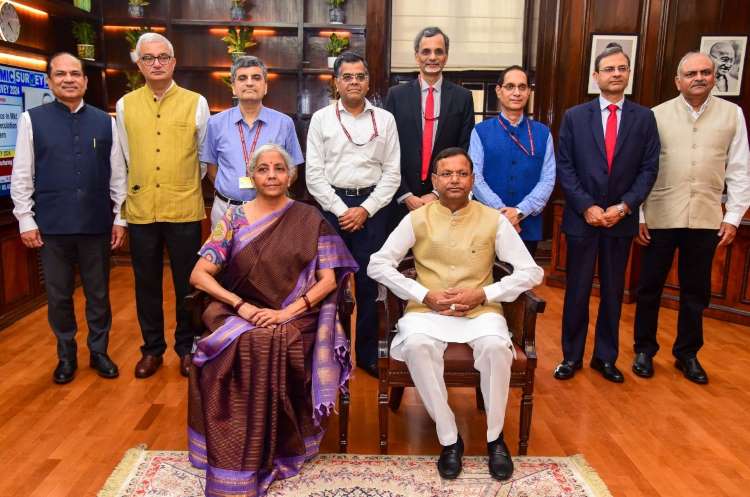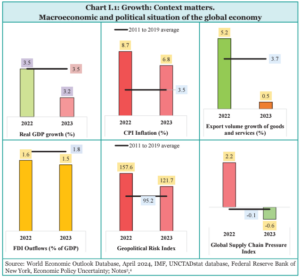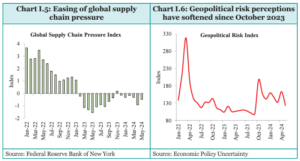
The Economic Survey 2023-24, released ahead of the Union Budget 2024 presentation, offers a comprehensive analysis of the state of the Indian economy, and its growth prospect for the current financial year. The Survey has set a conservative growth forecast of 6.5%-7%, reflecting caution amidst global uncertainties and domestic challenges.
The forecast contrasts with the previous fiscal year’s robust 8.2% growth, and is also lower than the RBI’s projection of 7.2% for the current year. Chief Economic Adviser V Anantha Nageswaran, whose office prepared the document, attributed this cautious stance to several factors, including slower private sector investment growth and unpredictable weather patterns impacting agricultural productivity. Additionally, geopolitical risks, growing protectionism, and supply chain concerns contributed to the conservative outlook. The global economic environment remains fraught with uncertainties, influencing the cautious stance taken by the Union government.
READ I Repo rate dilemma: Why RBI cannot ignore rising food, metal prices
Focus areas for sustained growth
Despite the conservative outlook, the Economic Survey emphasises several key areas requiring policy intervention to sustain medium-term growth beyond 7%. One of the primary areas of focus is job creation and skill improvement. Agriculture employs over 45% of the labour force, while manufacturing accounts for only 11.4%. The Survey highlights the subdued job growth in manufacturing and the urgent need to improve the skills of the country’s young population. With 65% of the population under 35, addressing the employability of youth is critical. Approximately 51% of young people are currently deemed employable, indicating a significant skills gap that needs to be bridged to harness the demographic dividend effectively.
Enhancing agricultural productivity remains a priority, given the sector’s vulnerability to weather patterns. The reliance on unpredictable weather highlights the need for innovative and sustainable farming practices to ensure stable growth. This includes adopting modern agricultural techniques, improving irrigation infrastructure, and ensuring better access to credit for farmers. Easing red tape for small businesses is another critical focus area.


The Economic Survey calls for reducing bureaucratic hurdles for small businesses, which are essential for job creation and economic diversification. Simplifying regulations can foster a more conducive environment for entrepreneurship and innovation, leading to a more dynamic and resilient economy.
Managing the shift to green energy is highlighted as a significant challenge. Raising financial resources for climate change adaptation and mitigation is crucial. The government must balance the transition to renewable energy sources while ensuring economic stability. This involves not only investing in renewable energy infrastructure but also supporting research and development in green technologies. The Survey suggests boosting investment from China while reducing imports to create a more balanced trade relationship. Leveraging Chinese investments can enhance domestic capacities, but it is also essential to diversify investment sources to mitigate geopolitical risks.
India’s corporate bond market lacks depth, dominated by highly-rated issuers and a limited investor base. Expanding this market can provide more financing options for businesses, fostering economic growth. Deepening the corporate bond market requires regulatory reforms to encourage a broader range of issuers and investors. Addressing income inequality through revised tax policies is crucial for promoting inclusive growth. The Survey suggests that tax policies will play an increasingly important role in closing economic gaps and ensuring that the benefits of growth are more evenly distributed across the population.
Economic Survey 2023-24 on risks for growth
The quality of health among India’s young population is another focus area. Improving healthcare access and outcomes is essential for sustaining long-term economic growth. A healthy workforce is more productive, and investments in healthcare can yield significant economic benefits. The Economic Survey 2023-24 notes that inflationary pressures have moderated in line with declining commodity prices and easing supply chain disruptions. However, it warns that geopolitical conflicts could revive inflationary pressures, influencing the Reserve Bank of India’s (RBI) monetary policy stance. The RBI’s recent decision to hold the repo rate at 6.50% reflects a cautious approach to curbing inflationary pressures.
Revising the consumer price index to reflect current consumption patterns, particularly excluding volatile food prices from core inflation metrics, is recommended. This adjustment aims to provide a more accurate measure of underlying inflation trends, helping policymakers to respond more effectively. For sustained growth exceeding 7%, the Survey identifies the need for structural reforms. Encouraging private sector investments, supporting small businesses, and enhancing agricultural productivity are crucial. Aligning educational outcomes with industry requirements is vital to address the skills gap and enhance employability.
The increasing participation of retail investors in derivative trading and the rise in market capitalisation relative to GDP are highlighted as potential market risks. The Economic Survey 2023-24 urges regulators to enhance investor awareness to mitigate these risks and ensure market stability. Additionally, it is essential to monitor the market capitalisation-to-GDP ratio, as excessively high values can indicate potential market instability rather than resilience.
The Economic Survey 2023-24 outlines a balanced approach to economic policy making. While the conservative growth forecast reflects caution amidst global and domestic uncertainties, the focus on structural reforms and key policy areas provides a roadmap for sustaining medium-term growth. The government’s ability to implement these recommendations effectively will be crucial in achieving the projected economic outcomes and addressing the underlying challenges facing the Indian economy. The Survey’s comprehensive analysis and targeted recommendations offer a clear direction for policy measures aimed at fostering a resilient and inclusive economy.
